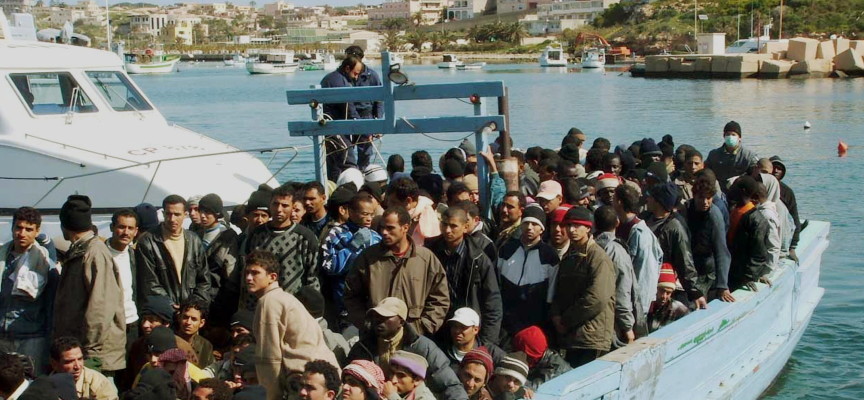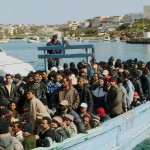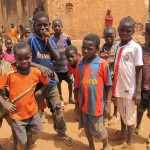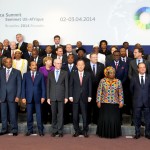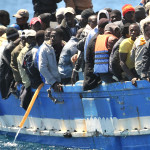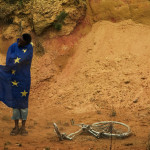New landings of people and families from Africa and the Middle East keep taking place on the shores of Sicily. Our neighbors, on the other coasts of the same Mediterranean Sea do not resign themselves to living in situations of war, poverty, persecution, but have set off and moved. Sometimes it’s anger that moves them, when they are the victims of Governments that invest more in weapons than in healthcare and education, of multinational corporations that exploit their lands; but sometimes it’s also the desire for new realities of peace and work to build a better future. For this reason, the landings will continue. What should we do? We, at Migrantes, would propose three actions.
- First of all, not to demobilize, but to continue and strengthen on a European level the italian operation Mare nostrum, which has allowed to guard the Mediterranean Sea, rescuing hundreds of families and people and, at the same time, controlling and catching boat drivers and people smugglers. What’s more, an extraordinary, new peace operation has been realized by means of military ships, pointing out that the boats that cross the Mediterranean Sea are mainly full of people fleeing from war zones (let’s just think about the situation in Syria, in the Middle East and in the Horn of Africa). To end this operation not only means to weaken our safety and that of whoever crosses the Mediterranean Sea, but it also means to give the Mediterranean Sea back to people smugglers. If anything, the operation should be accompanied by a further reinforcement of the SPRAR project (protection project for asylum seekers and refugees), which should make 8.000 italian municipalities open to hospitality as a political project, to renovate our communities starting from the young immigrants. Moreover, we should invest in the adaptation and the safety of the most important ports in terms of migrant arrivals, and in the staff needed for backing, for cultural mediation, for healthcare.
- To invest into cooperation and development right from the start. Today’s emergencies have a specific name: poverty, thirst and hunger, and the wars in a Continent such as Africa, beyond the Mediterranean Sea. People’s dramatic mobility, which is bound to grow in the years to come, could only be managed by means of big investments, not in weapons and in projects of exploitation of those lands, but in diplomatic actions of conflict mediation, in cooperation for development, in the condone of the poorest Countries’ foreign debt. And also by valuing the migratory journey of people and families as an economic and social resource in the European continent which, in the years to come – due to the falling birth rates – will have to count on immigrant businesses and manpower.
- From Europe, our common home which we’re about to renew with our votes, a signal will definitely have to come, starting from the Italian semester: that of a common political awareness for the valuing of migrations, with particular attention to the mobility of people, to the defense of those who ask for international protection, to the sharing of good practices (I’m thinking about the social protection of trade victims, to the operation Mare nostrum, to experiences of tutelage of minors and of families…). As the bishops of COMECE have written in their statement in view of the upcoming European elections, “the responsibility of welcoming and integration of migrants and asylum seekers should be shared by the member States in a proportional way. It is essential that the treatment of the migrants at the access point to the Country be humane, that their human rights be scrupulously respected and that, as a consequence, all efforts be made also by the Parishes, to ensure an effective integration into the receiving societies within the EU”.
Any fall into cultural, social and political interpretations of migrations tainted by biases that foster conflicts undermines our cities and doesn’t contribute to building a future together.
Continuano gli sbarchi di persone e famiglie dell’Africa e del Medio Oriente sulle coste siciliane. I nostri vicini, dalle altre coste dello stesso Mare Mediterraneo non si rassegnano a vivere in situazione di guerra, di povertà, di persecuzione, ma si sono messi in cammino. A muoverli talora è la rabbia di essere vittime di Governi che investono più in armi che in salute e scuola, di multinazionali che sfruttano le loro terre, ma anche il desiderio di nuove situazioni di pace e di lavoro per costruire un futuro migliore. Per questo, gli sbarchi continueranno. Cosa fare? Come Migrantes proponiamo tre azioni.
- Anzitutto, non smobilitare, ma continuare e rafforzare a livello europeo l’operazione Mare nostrum, che ha permesso di presidiare il Mediterraneo, salvando centinaia di famiglie e persone e, al tempo stesso, di controllare e catturare scafisti e trafficanti di esseri umani. Inoltre, attraverso navi militari, si è realizzata una straordinaria, nuova operazione di pace, sottolineando che le barche che solcano il Mediterraneo sono colme soprattutto di persone in fuga da situazioni di guerra (pensiamo solo alla situazione della Siria, al Medio Oriente e al Corno d’Africa). Chiudere questa operazione significa non solo indebolire la sicurezza nostra e di chi attraversa il Mediterraneo, ma significa anche ridare il Mediterraneo ai trafficanti di esseri umani. Semmai l’operazione dovrà essere accompagnata da un’ulteriore rafforzamento del progetto SPRAR, che apra i nostri 8.000 Comuni a un’accoglienza come progetto politico, per rinnovare le nostre comunità a partire dai giovani migranti. Inoltre, si dovrà investire nell’adeguamento e nella sicurezza dei porti importanti per gli arrivi dei migranti, oltre che in personale necessario per l’accompagnamento e la mediazione culturale, la tutela sanitaria.
- Da subito investire in cooperazione e sviluppo. Oggi l’emergenza ha anzitutto un nome: la povertà, la fame e la sete, le guerre di un Continente come l’Africa al di là del Mediterraneo. La drammatica mobilità delle persone, destinata ad aumentare nei prossimi anni, potrà essere gestita solo con grossi investimenti non in armi e in progetti di sfruttamento di queste terre, ma in azioni diplomatiche di mediazioni dei conflitti, in investimenti in cooperazione allo sviluppo, nel condono del debito estero dei Paesi più poveri, valorizzando anche il cammino migratorio di persone e famiglie come risorsa economica e sociale nel continente europeo, destinato nei prossimi anni – causa la denatalità – a dover far conto su imprenditorialità e manodopera di immigrati.
- Dall’Europa, la casa comune che andiamo a rinnovare con il voto, sarà indispensabile che arrivi, a partire dal semestre italiano, il segnale di una consapevolezza politica comune della valorizzazione delle migrazioni, con un’attenzione particolare alla mobilità delle persone, alla tutela di chi chiede una protezione internazionale, allo scambio di buone prassi (penso alla protezione sociale delle vittime di tratta, all’operazione Mare nostrum, a esperienze di tutela dei minori e delle famiglie…). Come scrivono i vescovi della COMECE nella dichiarazione in vista delle prossime elezioni europee, “la responsabilità dell’accoglienza e dell’integrazione dei migranti e dei richiedenti asilo deve essere condivisa in maniera proporzionale dagli Stati membri. È vitale che il trattamento dei migranti al punto d’accesso al territorio sia umano, che i loro diritti umani vengano scrupolosamente rispettati e che di conseguenza ogni sforzo venga compiuto anche da parte delle Chiese, per assicurare un’integrazione efficace nelle società riceventi all’interno dell’UE”.
Ogni caduta in letture culturali, sociali e politiche delle migrazioni viziata da pregiudizi che alimentano conflittualità mina le nostre città e non costruisce il futuro insieme.
Giancarlo Perego
direttore generale Fondazione Migrantes (Italia) e consultore del Pontificio consiglio per la pastorale dei migranti e degli itineranti
Latest posts by Giancarlo Perego (see all)
- It’s to wake up from sleep - 29 luglio 2015
- Mare Nostrum, the sign and the dream - 1 novembre 2014
- From “Mare nostrum” to Ukraine - 31 agosto 2014

